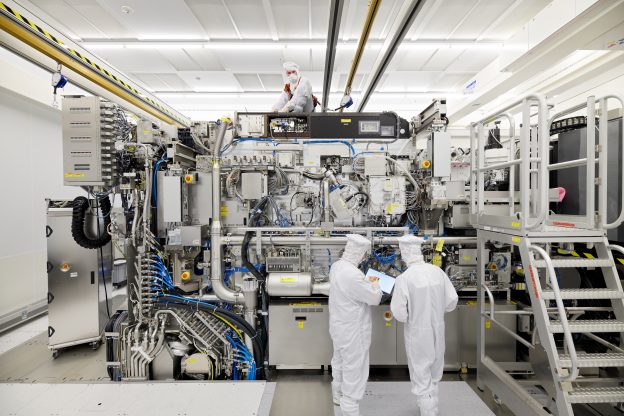Popular Keywords
- About Us
-
Research Report
Research Directory
Semiconductors
LED
Consumer Electronics
Emerging Technologies
- Membership
- Price Trends
- Press Center
- News
- Events
- Contact Us
News
- Home
- News
[News] The Battle on Advanced Processes Intensifies as ASML Plans to Produce Ten Equipment Capable of 2nm Chip Production Next Year

As TSMC, Samsung, and Intel compete fiercely in the race for 2nm advanced processes, a new wave of the “battle for crucial equipment” is simultaneously unfolding.
According to South Korean reports, ASML, the leader in semiconductor advanced lithography equipment, plans to manufacture ten equipment capable of producing 2nm chips next year, while aiming to increase its annual production capacity to 20 devices in the coming years.
Intel has secured up to six of the 10, taking the lead, while Samsung is also actively pursuing the procurement of the equipment. TSMC faces significant pressure in this competitive landscape.
South Korean tech media SamMobile has unveiled that as major semiconductor manufacturers announce plans to start producing 2nm chips in 2025, ASML is set to unveil equipment capable of manufacturing chips using the 2nm process in the coming months.
The latest extreme ultraviolet (EUV) lithography equipment is expected to increase the numerical aperture (NA) from 0.33 to 0.55. This enhancement improves the light-collecting capability of the optical system, enabling semiconductor fabs to utilize advanced patterning techniques for the production of 2nm process chips.
ASML is the sole global manufacturer of advanced EUV equipment for processes at 7nm. These equipment are not only expensive, costing several million dollars each, but they also have limited production capacity.
It has led to high demand from major semiconductor manufacturers like Samsung, Intel, and TSMC. Currently, only five chipmakers globally, including TSMC, Samsung, SK Hynix, Intel, and Micron, require EUV equipment, with TSMC accounting for 70% of EUV purchases.
Consequently, Samsung is actively pursuing collaboration and has signed a historic agreement with ASML to jointly invest KRW 1 trillion (approximately USD 755 million) in establishing a research and development facility in South Korea.
This collaboration aims to contribute to the development of Samsung’s 2nm process. Samsung plans to commence the production of 2nm process chips by the end of 2025 after acquiring the 2nm manufacturing equipment.
Samsung Electronics Vice Chairman Kyung Kye-hyun, who heads the Device Solutions Division, emphasized that the new agreement with ASML will assist Samsung in acquiring the next-generation high NA EUV equipment.
Kyung said, “Samsung has secured a priority over the High-NA equipment technology. (From the trip), I believe we created an opportunity for us to optimize the usage of High-NA technology for our production of DRAM memory chips and logic chips in the long term.”
On the Intel front, as part of its IDM 2.0 strategy, it is executing a 5 nodes in four years process development plan. Intel emphasizes that its Intel 20A process is progressing towards volume production readiness as planned, while the Intel 18A process is scheduled to test production phase in the first quarter of next year.
Facing the strong competition from Samsung and Intel, TSMC is not sitting idle. According to reports citing from Financial Times, TSMC has showcased its 2nm prototype test results to major clients like Apple and NVIDIA.
TSMC previously mentioned in its earnings call that it expects the 2nm process to enter mass production as scheduled in 2025. The company’s 2nm backside power rail solution is scheduled for the latter half of 2025, with mass production slated for 2026.
Read more
- [News] Samsung’s Discount Strategy Challenges TSMC as the Battle for 2nm Orders Heats Up
- [News] Samsung, ASML Invest KRW 1 Trillion in Korean Research Fab as Netherlands-Korea Semiconductor Alliance Formed
(Photo credit: ASML)
Please note that this article cites information from SamMobile
Subject
Related Articles
Recent Posts
- [News] US Allocates USD 39 Billion Subsidy to Semiconductor Industry for Establishing Plants
- [News] SMIC’s Net Profit Halved Last Year, Faces Further Reductions This Year
- [Insights] Memory Spot Price Update: Limited DRAM Quotes, Weak NAND Flash Momentum
- [News] TSMC’s JASM Kumamoto Plant 2 Greenlit, Construction Expected to Commence by Year’s End
- [Insights] EV Development Faces New Challenges, Porsche CFO Suggests Delay in European Ban on New Fuel Cars
Recent Comments
Archives
- February 2024
- January 2024
- December 2023
- November 2023
- October 2023
- September 2023
- August 2023
- July 2023
- June 2023
- May 2023
- April 2023
- March 2023
- February 2023
- January 2023
- December 2022
- November 2022
- October 2022
- September 2022
- August 2022
- July 2022
- June 2022
- May 2022
- April 2022
- March 2022
- February 2022
- January 2022
- December 2021
- November 2021
- October 2021
- September 2021
- August 2021
- July 2021
- June 2021
- May 2021
- April 2021
- March 2021
- February 2021
- January 2021
Categories
- 5G Technologies
- AR / VR
- Artificial Intelligence
- Automotive Technologies
- Broadband & Home Network
- Cloud / Edge Computing
- Consumer Electronics
- Display
- Display Supply Chain
- Display Technologies
- DRAM
- Emerging Technologies
- Energy
- IC Design
- IC Manufacturing, Package&Test
- Industry 4.0
- IoT
- IR LED / VCSEL / LiDAR Laser
- LCD
- LED
- LED Backlight
- LED Demand / Supply Data Base
- LED Display
- LED Lighting
- Lithium Battery and Energy Storage
- Micro LED / Mini LED
- Monitors / AIO
- NAND Flash
- Notebook Computers
- OLED
- Others
- Panel Industry
- Semiconductors
- server
- Smartphones
- Solar PV
- Tablets
- Telecommunications
- TVs
- Upstream Components
- Wafer Foundries
- Wearable Devices
- 未分類




